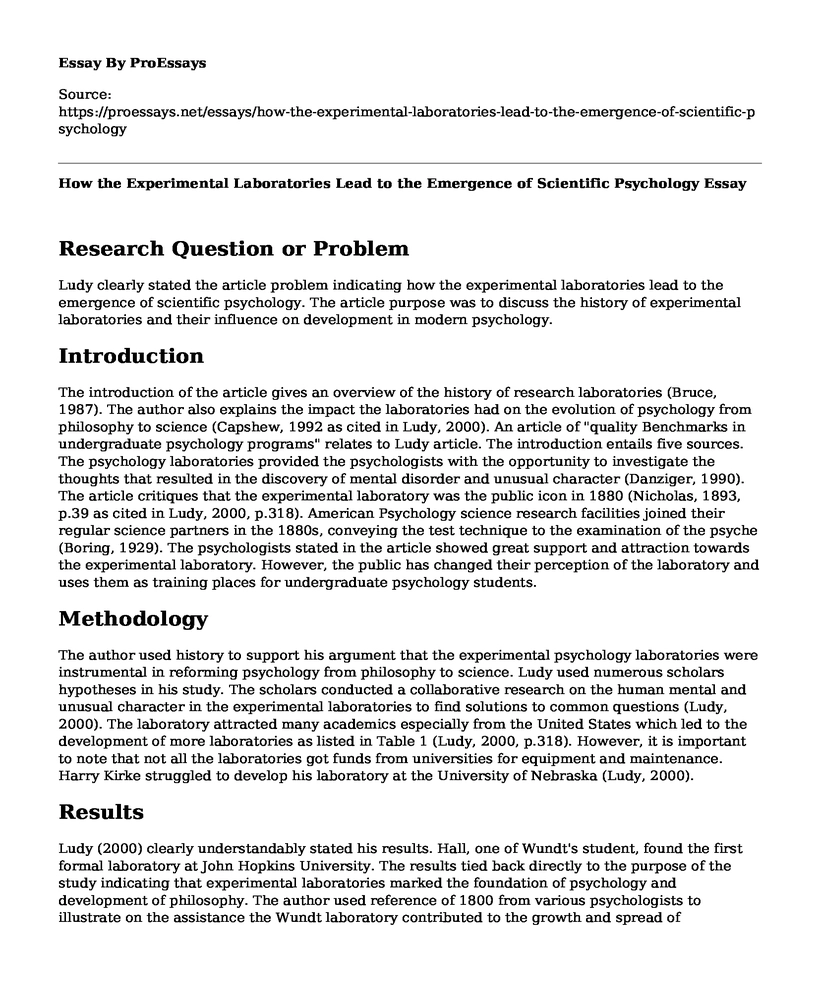Research Question or Problem
Ludy clearly stated the article problem indicating how the experimental laboratories lead to the emergence of scientific psychology. The article purpose was to discuss the history of experimental laboratories and their influence on development in modern psychology.
Introduction
The introduction of the article gives an overview of the history of research laboratories (Bruce, 1987). The author also explains the impact the laboratories had on the evolution of psychology from philosophy to science (Capshew, 1992 as cited in Ludy, 2000). An article of "quality Benchmarks in undergraduate psychology programs" relates to Ludy article. The introduction entails five sources. The psychology laboratories provided the psychologists with the opportunity to investigate the thoughts that resulted in the discovery of mental disorder and unusual character (Danziger, 1990). The article critiques that the experimental laboratory was the public icon in 1880 (Nicholas, 1893, p.39 as cited in Ludy, 2000, p.318). American Psychology science research facilities joined their regular science partners in the 1880s, conveying the test technique to the examination of the psyche (Boring, 1929). The psychologists stated in the article showed great support and attraction towards the experimental laboratory. However, the public has changed their perception of the laboratory and uses them as training places for undergraduate psychology students.
Methodology
The author used history to support his argument that the experimental psychology laboratories were instrumental in reforming psychology from philosophy to science. Ludy used numerous scholars hypotheses in his study. The scholars conducted a collaborative research on the human mental and unusual character in the experimental laboratories to find solutions to common questions (Ludy, 2000). The laboratory attracted many academics especially from the United States which led to the development of more laboratories as listed in Table 1 (Ludy, 2000, p.318). However, it is important to note that not all the laboratories got funds from universities for equipment and maintenance. Harry Kirke struggled to develop his laboratory at the University of Nebraska (Ludy, 2000).
Results
Ludy (2000) clearly understandably stated his results. Hall, one of Wundt's student, found the first formal laboratory at John Hopkins University. The results tied back directly to the purpose of the study indicating that experimental laboratories marked the foundation of psychology and development of philosophy. The author used reference of 1800 from various psychologists to illustrate on the assistance the Wundt laboratory contributed to the growth and spread of psychology globally (Ludy, 2000). Table 1 in the article indicates how psychology rapidly spread since the foundation of the Wundt laboratory. Ludy (2000), uses castell's letter to reveal the test the professionals conducted in the laboratories. The article also indicates that the public believed that experimental psychology labs were similar to natural science laboratories. Ludy (2000), lastly cite studies of 1900 to show the evolution of psychology laboratories in the twentieth century.
Discussions
Ludy (2000), concludes that the psychology laboratories have evolved. Psychology has advanced into a discipline of science in which the laboratory is no longer a public icon but instead training place for the psychology students (Ludy, 2000). The laboratory is not the only place for psychologists and scholars but also part of the curriculum for enrollment of all psychology students. However, the article did not recommend any further research.
List of References
The author uses references that supports the article purpose, and their formats are consistent. All the references that the author use are cited in the entire article. Ludy (2000) cites numerous sources that mostly dated back from the 1880s to 1990s because of the historical approach of the article.
Personal Reaction
The study gives answers many people's question on the emergence of psychology and how the subject is scientifically acceptable. Contrary to the public expectation, the author provides an experimental laboratory as the answer to the question. The author employed an active intervention of methodology that was simple to implement and easy to understand. Additionally, the author used scientific methods to test his hypotheses.
However, a limitation is that the author did not mention the perception of another natural science curriculum. Do the natural science support psychology as a complement to science or are they against it? The author only indicates the number of laboratories established during the era but do not provide information on the experimental methods the scholars used to conduct the study in the lab.
Reference
Ludy T. Benjamin, Jr. (2000). The psychology laboratory at the turn of the 2oth century. American Psychologist, 55(3), 318-321. doi:10.1037/0003-066X.55.3.318
Cite this page
How the Experimental Laboratories Lead to the Emergence of Scientific Psychology. (2022, Dec 04). Retrieved from https://proessays.net/essays/how-the-experimental-laboratories-lead-to-the-emergence-of-scientific-psychology
If you are the original author of this essay and no longer wish to have it published on the ProEssays website, please click below to request its removal:
- Paper Example on Deviance Behavior of Lee Malvo and John Muhammad
- Proofs and Disproof's of the Big Bang Theory Essay
- Paper Example on Creativity in the Workplace: A Vital Aspect for Success
- Essay Example on Memoirs: Remembering Past Events and People
- Essay Example on Mental Illness: Challenges, Symptoms & Care Needed
- Essay Example on Education: The Key to Modernization and Living A Fulfilling Life
- Essay Sample on Overcoming Physical Disabilities: Borges' Perspective







